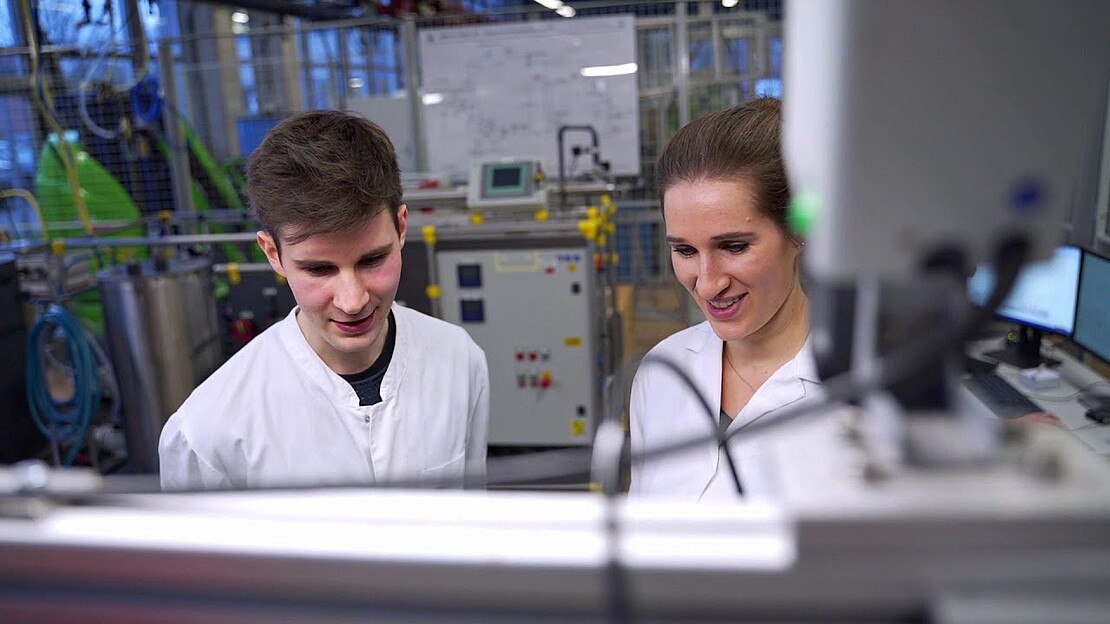Environmental Engineering
This Bachelor of Science degree course in Environmental Engineering explores ways to sustainably manage and implement natural resources, renewable energies, energy saving, the purification of sewage/waste water and exhaust air, chemical analysis, and environmental issues in businesses and organisations.
Our academic staff’s network of contacts in Germany and beyond will enable you to gain international practical experience in businesses, governmental and supervisory organisations, higher education or research institutions, or with independent engineering firms. We have cooperation agreements with European institutions which cover the recognition of courses and classes you take there.
Your future career
................................................................................................................................................................................................
Appropriate environmental management in engineering calls for a high level of expertise across scientific disciplines, which is crucial if environmental engineers are to identify, assess, tackle and avoid the wide range of environmental problems that occur in industrial and emerging economies alike. Accordingly, this degree course has a distinctly interdisciplinary character, making it one of the few courses in Germany which teach key scientific principles, including biology, alongside technical and engineering content. This broad-based early-stage curriculum forms ideal foundations for specialisation in one of the course’s two focal areas, environmental assessment and renewable energies.
The course provides students with the skills they will need to assess, predict and estimate the inevitable environmental impact of major industrial projects. You’ll learn how to develop the technical and planning sides of environmental solutions in a business-aware and cost-conscious manner while complying with environmental legislation.
Environmental engineers work in a diverse range of fields, often in areas which call for an overarching view of environmental impacts and the application of techniques for reducing pollution of water, air or soil. Some of them plan, develop and help run energy and environmental plants.
Environmental engineers may:
- act as environmental officers in large corporates
- advise businesses on the current state of the art in environmental engineering and technology
- plan wind farms, biogas plants or major solar arrays
- work as sales engineers for measurement and analysis technology
- measure water and air quality on behalf of large companies or monitoring authorities
- draw up life cycle assessments relating to energy and materials for manufacturing businesses and public institutions
Course content and structure
................................................................................................................................................................................................
The degree course commences with classes on general scientific and engineering principles, in areas such as mathematics, physics, chemistry, and heat and material transfer. As the course progresses, students acquire knowledge of process engineering and environmental measurement techniques. On the basis of these key principles, students proceed to specialise in one of the course’s two focal areas:
- Renewable energies
- Environmental assessment
Semester 6 of the course is reserved for an internship in a business, a public authority or institution, or an independent engineering firm. Protecting our environment is a cross-border task, and so we use our network of contacts to give students the opportunity to complete their internship semester abroad; further, the cooperation agreements we have concluded with higher education institutions in other European countries mean that each institution recognises courses taken at the other. The seven-semester degree course ends with your Bachelor thesis.
Your interests and skills
................................................................................................................................................................................................
To succeed in this degree course, you should be interested in environmental issues, science, engineering and technology in general, and in solving scientific and engineering issues in particular, and you’ll find the course easier if you have a sound knowledge of maths, physics, chemistry and biology. Ideally, you’ll be a strong communicator and enjoy connecting with specialists from other disciplines.
Interested – but not quite sure yet whether this is the right course for you? Our self-assessment test can help you make up your mind. Take it here: HAW Navigator.
Application process
................................................................................................................................................................................................
We only accept online applications. Before applying, applicants must register with www.hochschulstart.de. During the application period (for the winter semester: 1 June–15 July; for the summer semester: 1 December–15 January) you can find the online application and detailed information about the application process on the Applying for a Bachelor's degree course page.
You can find information about the selection process and the numerus clausus (NC) from the previous semester here: Applying for a Bachelor's degree course/Selection criteria
International applicants are also required to apply during the application period.
To make the process easier for you, we have compiled a step-by-step checklist: International applicants
Questions about selecting a course, applications, admissions and degree courses
................................................................................................................................................................................................
Applications and admissions
Student Admissions and Registration Office (Studierendensekretariat)
Stiftstraße 69, 20099 Hamburg (ground floor)
T +49.40.428 75-9898
studierendensekretariat (at) haw-hamburg (dot) de
Contact us with your questions about applications and admissions
The Information Point is open at the following times:
Monday–Thursday: 10:00 am–1:00 pm
Friday: closed
In-person office hours:
Thursday: 2:00 pm–4:00 pm
Telephone office hours:
Monday and Tuesday: 9:00 am–10:00 am
For general queries about HAW Hamburg degree courses and course choice
Student Counselling Team (Zentrale Studienberatung)
Stiftstraße 69, 1st floor, room 122
20099 Hamburg
T +49 40 42875 9110
Contact form
Office hours
Contact person for applicants with disabilities or chronic health conditions
Meike Butenob/Dieter Röh
Stiftstraße 69, Haus 3, room 37
Tel. +49.40.428 75-7220
inklusion (at) haw-hamburg (dot) de
Contact the department
................................................................................................................................................................................................
Specifically subject-related queries
Student advisor
Prof. Dr. Carsten Frank
Ulmenliet 20, room CO 09, 21033 Hamburg
Tel.: + 49.40.428 75-6509
carsten.frank( (at) )haw-hamburg (dot) de
Advice on pre-course experience:
Prof. Dr. Holger Mühlberger
Ulmenliet 20, room N 5.05, 21033 Hamburg
Tel.: +49.40.428 75-6071
holger.muehlberger(@)haw-hamburg.de
Advice on the in-course internship:
Prof. Dr. Sebastian Timmerberg
Ulmenliet 20, Raum N5.04, 21033 Hamburg
Tel.: + 49.40.428 75-6480
sebastian.timmerberg (at) haw-hamburg (dot) de

